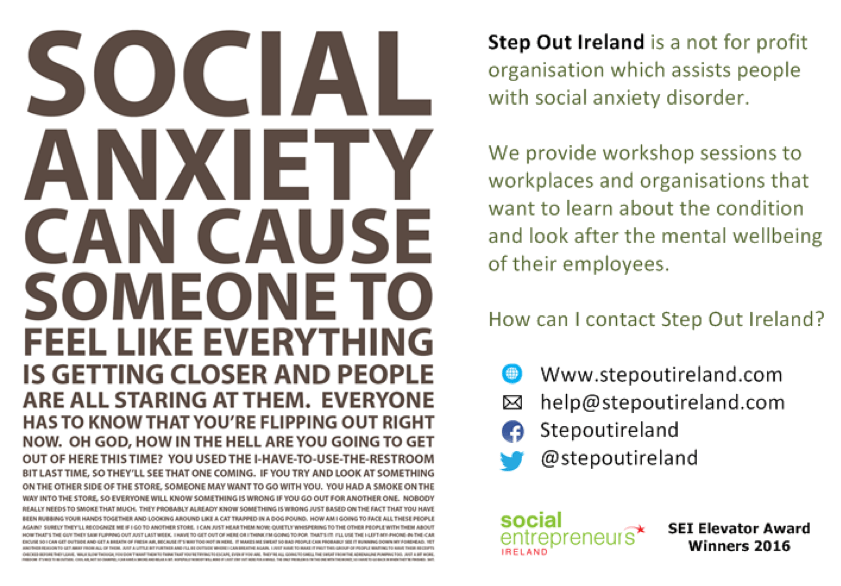I have covered previously how social anxiety disorder can have a significant impact in the workplace, including avoiding interactions with other employees, panic attacks, procrastination and missed deadlines, difficulties with memory, and much more.
Often overlooked in discussions about depression in the workplace is that social anxiety disorder can be a related factor. According to the various studies, nearly half of people diagnosed with depression have also been diagnosed with an anxiety disorder including social anxiety disorder. This is a significant statistic taking into account the amount of suicides that happen on a yearly basis in Ireland alone.
Anxiety symptoms versus anxiety disorders
It’s important to understand there is a difference between simply experiencing symptoms of anxiety and suffering from an anxiety disorder. Most, if not all, employees deal with varying levels of anxiety in their day-to-day experiences in the workplace. Anyone who has been under deadline on an important project intuitively understands a little bit of stress can actually be great for productivity — but only up to a point. Too much stress or excessive anxiety leads to decreased output and at some point can become disabling.
At the most basic level, employees with anxiety disorders often avoid additional tasks, social interaction and attention from others. Some engage in asking for feedback or reassurance far more than other employees. Many employees with anxiety feel as though they are already at their limit in terms of ability to tolerate stress, and they have difficulty managing any additional changes or stressors that are bound to occur in the course of day-to-day life in the workplace.
Accommodating anxiety
In addition to healthcare costs, anxiety disorders can contribute to lost productivity. Despite the complexity in which an anxiety disorder can present itself, some basic steps and accommodations can help employees with anxiety deal with day-to-day stressors and improve productivity:
- Show concern.First, as with many other workplace mental health issues, those with anxiety will benefit from knowing that their employer is genuinely concerned with improving their health and wellness in the workplace, and from seeing that their employer does not discriminate against or marginalise those with mental health issues. Feeling that an employer will be judgmental for disclosing their mental health difficulties can often worsen the condition.
- Identify behaviour-specific performance feedback.When reaching out to the employee to address any work-related problems, ensure that you’re focusing on what behaviours they’re exhibiting in the workforce, rather than overreaching theories. For example, instead of saying, “You look anxious,” or “You look tired,” try “I see you’ve missed a few days of work lately. Is everything okay?” No matter your conversation, however, ensure you’re approaching the discussion with empathy.
- Encourage predictable tasks.A way to curb anxiety can be assigning tasks to the employee that come with a certain amount of predictability — that way, the employee knows the parameters associated with a specific task. The routine helps those with anxiety because they know the steps to follow.
- Match temperament to job responsibilities.Where it has been identified that an employee has difficulty with social encounters, it wouldn’t be wise to have him or her facilitate large meetings or entertain clients when they come to town. Help accommodate them by finding the right type of work for their comfort level.
As simple as it sounds, just being open and accepting about mental health issues can go a long way toward a healthier workplace. Although some stress can be good for job performance, an abundance of anxiety can hinder employee productivity — and potentially result in a larger problems such as depression and substance abuse issues.
As employers and colleagues alike, make the workplace for those with social anxiety disorder a more welcoming, inclusive and non-judgmental space. Most of all remember that mental health disorders can affect anyone often without warning, help create a workplace that could someday help you through your mental health difficulties.
To discuss how Step Out Ireland can improve the approach to mental health and more specifically Social Anxiety Disorder in your workplace get in contact with us at help@stepoutireland.com or stepoutireland.com
Support Our Campaign
We rely on the generosity of the public to fund our work and so far together we have achieved great things! Please do continue to support us so we can provide future generations in Ireland with the resources to recognise and talk about their emotions, and equip them to navigate the ever-changing world around them as they grow





























